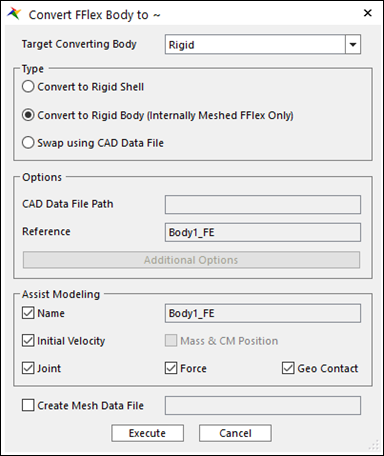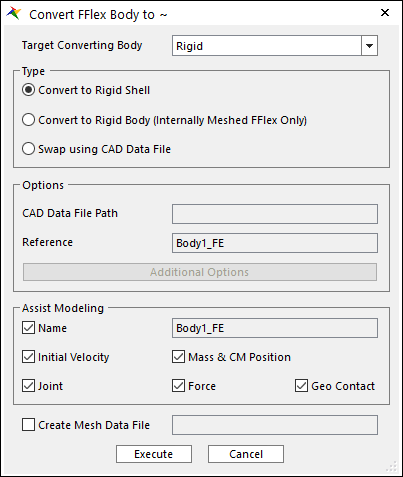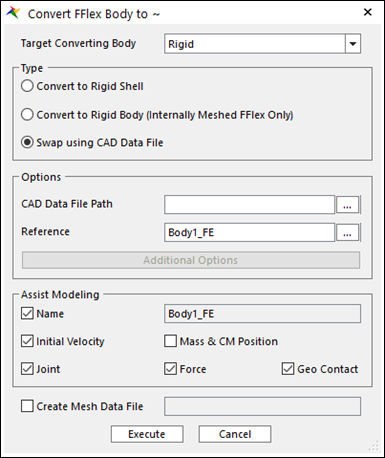11.1.2.3. Method: FFLEX to RIGID
If a FFlex body is selected as a source body for G-Manager, Rigid, FFlex, and RFlex body can be converted. When the target body is Rigid body, three methods are supported to convert FFlex body.
11.1.2.3.1. (4) Rigid : Convert to Rigid Body (Internally Meshed FFlex Only)
When the target body is Rigid body, if the user wants to convert a FFlex body to the original rigid body before meshing, Convert to Rigid Body (Internal Meshed FFlex Only) type can be used. This type is activated for meshed body in RecurDyn.

Figure 11.12 Convert to Rigid Body (Internally Meshed FFlex Only) Type
Target Converting Body: Select a target body type. In this case, please select Rigid.
Type: Select a method how to change from FFlex to Rigid. In this case, please select Convert to Rigid Body (Internally Meshed FFlex Only).
Assist Modeling: some items can be maintained after converting process.
Name: Maintains the name of source body.
Initial Velocity: Maintains the initial velocity of source body.
Joint: Maintains Joint entities related to the source body.
Force: Maintains Force entities related to the source body.
Geo Contact: Maintains Geo Contact entity related to the source body. Other Contact entities are not supported.
In the case of Geo Surface Contact, the whole surface of the base or action geometry is used for the contact.
In the case of Geo Curve Contact, the first edge of the base or action geometry is sued for the contact.
Create Mesh Data File: If this option is checked, the Mesh Data file for the current FFlex body is created in the defined directory when converting to other types.
11.1.2.3.2. (5) Rigid : Convert to Rigid Shell
When the target body is Rigid body, if the user wants to convert a FFlex body to a rigid body using shell data is extracted from FFlex body. Convert to Rigid Shell type can be used. If using this function manually, it is supported in Body Edit mode for FFlex. Refer to Export Shell Data File.

Figure 11.13 Convert to Rigid Shell Type
Target Converting Body: Select a target body type. In this case, please select Rigid.
Type: Select a method how to change from FFlex to Rigid. In this case, please select Convert to Rigid Shell.
Assist Modeling: some items can be maintained after converting process.
Name: Maintains the name of source body.
Initial Velocity: Maintains the initial velocity of source body.
Joint: Maintains Joint entities related to the source body.
Force: Maintains Force entities related to the source body.
Geo Contact: Maintains Geo Contact entity related to the source body. Other Contact entities are not supported.
In the case of Geo Surface Contact, the whole surface of the base or action geometry is used for the contact.
In the case of Geo Curve Contact, the contact is removed.
Mass & CM Position: Maintains the mass and CM position of the source body.
Create Mesh Data File: If this option is checked, the Mesh Data file for the current FFlex body is created in the defined directory when converting to other types.
11.1.2.3.3. (6) Rigid : Swap using CAD Data File
When the target body is Rigid body, if the user wants to swap with a CAD data file, Swap using CAD Data File type can be used.

Figure 11.14 Swap using CAD Data File Type
Target Converting Body: Select a target body type. In this case, please select Rigid.
Type: Select a method how to change from FFlex to Rigid. In this case, please select Swap using CAD Data File.
Options
CAD Data File Path: Define a path of the file that is used to swap.
Reference: Define a reference frame that is used to swap.
Assist Modeling: some items can be maintained after converting process.
Name: Maintains the name of source body.
Initial Velocity: Maintains the initial velocity of source body.
Joint: Maintains Joint entities related to the source body.
Force: Maintains Force entities related to the source body.
Geo Contact: Maintains Geo Contact entity related to the source body. Other Contact entities are not supported.
In the case of Geo Surface Contact, the whole surface of the base or action geometry is used for the contact.
In the case of Geo Curve Contact, the first edge of the base or action geometry is sued for the contact.
Mass & CM Position: Maintains the mass and CM position of the source body.
Create Mesh Data File: If this option is checked, the Mesh Data file for the current FFlex body is created in the defined directory when converting to other types.